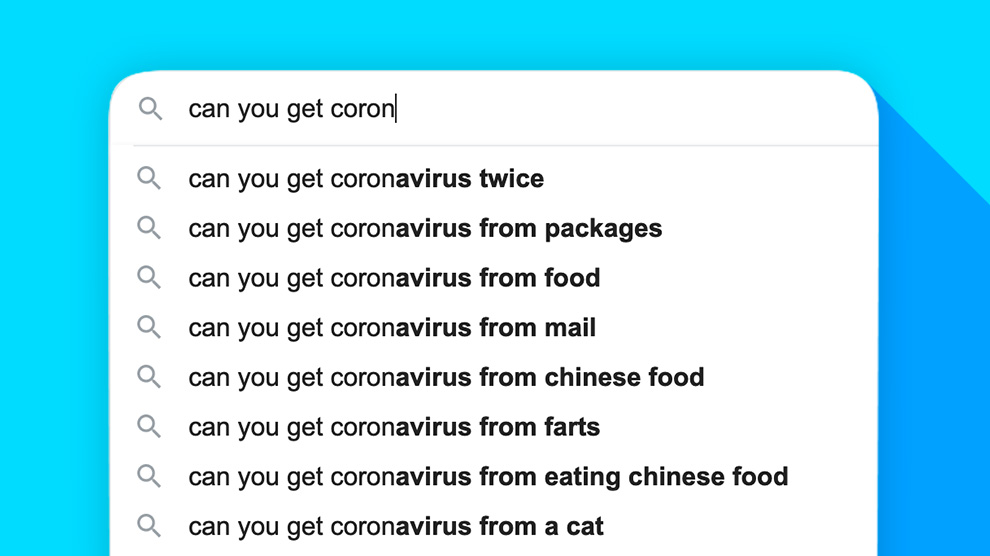
Mother Jones illustration
Misinformation about the novel coronavirus has been running rampant ever since the respiratory ailment emerged in Wuhan, China, late last year. Here at Mother Jones, we’re all about setting the record straight. Google recently revealed the top questions that people have been asking about the epidemic. We took that as our cue to take a crack at some of the other questions people have been typing into their Google search bars.
We asked Brandon Brown, an epidemiologist and associate professor at the University of California, Riverside, all the most popular and unpopular questions people are wondering, probably, about the virus. (And, before you ask, no, you can’t get the coronavirus from Corona beer.)
The conversation below has been lightly edited for length and clarity.
Does the flu vaccine protect against the coronavirus?
It’s a different kind of virus. Take human papillomavirus for example. There’s a bunch of types of HPV, and you can get infected by multiple types, so if you get one, it’s not protective against others. That’s kind of a similar way to think about it with the flu and coronavirus, because they’re both so different types of viruses that it’s not expected that just because you’ve had the flu vaccine or you’ve had the flu, that you’d be protected against the other virus.
Who gets sick from the coronavirus and why?
Right now, the people that are getting the sickest from coronavirus are adults over age 65. This is a little bit different than the flu, because the flu reaches that population but also children under the age of 2, also pregnant women and people with chronic health conditions.
Can you get the coronavirus from a cat or a dog?
A lot of the viruses that we know about today, including a lot of the coronaviruses, originated in animals. It could be bats, pigs, chickens, depending on the virus. But there’s been no report of any transmission from our domestic animals to humans in this country.
Can you get coronavirus from a package?
The virus can survive on various surfaces. It tends to live better when it’s on colder surfaces. Last thing I read is that viruses on surfaces could remain infectious anywhere from two hours to nine days. People are pretty worried about, “How many people have touched my mail?” “How many people have touched my food?” “How many people have touched the pump at the gas station?” The best way to assuage that fear, since the virus can live on surfaces for a longer period of time, is to practice proper hand washing.
If we’re in an office setting, if someone has touched a surface and they’re visibly sick, and they’re sneezing or coughing, and we touch that surface—it could be a doorknob, it could be a desk—and then we proceed to touch our eyes, nose, or mouth, this is another way that the virus can be transmitted. So it’s not only about things that people are worried about, but it’s about our everyday lives as well. The one way that we can protect ourselves from that is with proper hand washing.
Can you get the coronavirus from food?
It’s a possibility, only if the person who is preparing the food, transporting the food, or sharing the food is infectious. In terms of the food originating from an animal that is sick and then getting someone else sick who’s eating the animal, I don’t think that’s as common, because the virus can persist for two to nine days in the optimal conditions, which is cold conditions, and usually a lot of the food that we’re eating that other people are preparing is warm food.
Given that the virus thrives in cold environments, is it likely to fizzle out as warm weather approaches?
Yeah, that’s one of the reasons why we see the common cold or the flu epidemic every year takes control during the winter months, and then it tends to taper off in the spring and summer, and then it comes back with a vengeance again each winter.
Can you get the coronavirus twice?
We would imagine that after being infected with the coronavirus, you would be less likely to be infected again. We could look at something like the flu virus as an example to learn about that. We know so little about COVID-19, the novel coronavirus, that we don’t know exactly if there’s a bunch of subtypes, like there are for the flu, and if it’s possible to be infected by two different subtypes.
Can you get the coronavirus from sex?
There is no indication that coronavirus is sexually transmitted. I would think this is unlikely in the future, since flu is not sexually transmitted. But, if we are in close contact with someone who has symptoms of flu or coronavirus (coughing, sneezing, runny nose, fever, headache) as we might be during sex, the likelihood of transmission for non-sexual reasons would be high. Also, infection with any virus including something like an STD can cause initial symptoms similar to the flu.
Is a comparison to the Spanish Flu relevant in the US, in the developing world, or not at all?
Not at all. The Spanish Flu infected upwards of 500 million people and killed 50 million people. We’re seeing the total deaths now seeming to move up slowly for the coronavirus as more people are recovering, and it’s kind of tending to slow down. Fifty million people in the world is a lot. We learned a lot about the Spanish flu. We learned a lot from H1N1, we learned a lot from SARS and Ebola, so hopefully we’ve learned our lesson from all these other outbreaks that have happened prior to the coronavirus. We know that the fatality rate for the current novel coronavirus is around 2 percent, just among the cases that we’re seeing. And this might be an overestimation. We also know that the fatality rate for the flu is .01 percent, or around there. So I would say that, if we want to compare coronavirus to something, we should probably compare it to the flu.
♦
There’s one question that showed up in Google’s suggested search terms that I didn’t ask Brown: whether you can get coronavirus from farts. You probably won’t get a virus from a fart, but if you’re close enough to someone with coronavirus to worry about this, you’re likely to be infected through other means.

















